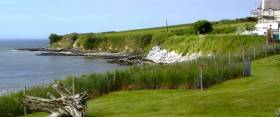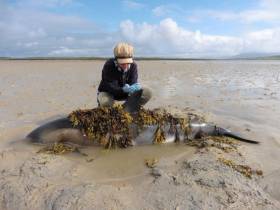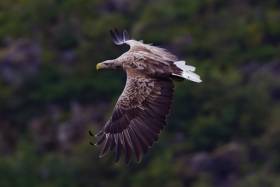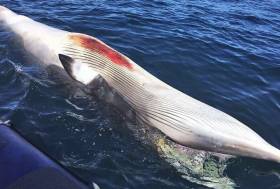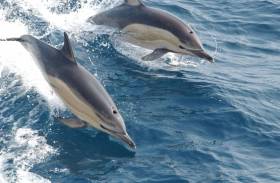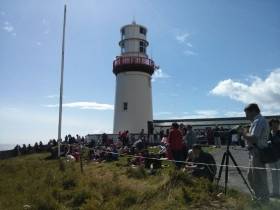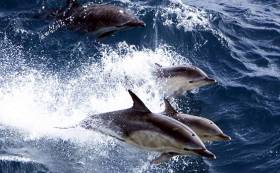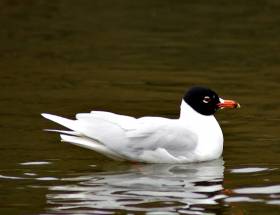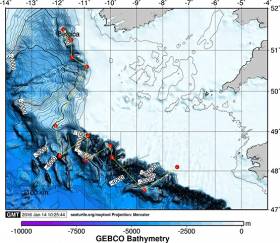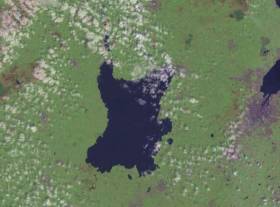Displaying items by tag: marine wildlife
Caravan Park Visitors Help Rescue Dolphins From Loop Head Beach
#MarineWildlife - Holidaymakers on the Loop Head Peninsula sprang into action to rescue two common dolphins stranded on a nearby beach, as the Irish Examiner reports.
Visitors staying at Doonaha's Green Acres caravan park used buckets of water to keep the mother and calf wet and tarps to help lift them into deeper waters off the rocky shore before a team from Shannon Dolphin and Wildlife Foundation arrived.
The Irish Examiner has more on the story HERE.
#MarineWildlife - The Irish Whale and Dolphin Group (IWDG) has reiterated the need for localised stranding plans after the death of two common dolphins that stranded in Mayo's Blacksod Bay in late July.
Aoife Foley of the IWDG writes that the two dolphins were part of a pod of five that were spotted close to the shore at Mullaghroe Beach on Saturday 23 July.
A team from the Broadhaven Bay Marine Mammal Monitoring Programme joined local marine biologist Machiel Oudejans to move the dolphins, which did not appear to be injured or in obviously poor health, back into deeper waters and out to sea.
However, the following afternoon a member of the programme team saw that two of the marine mammals had stranded on the same stretch of beach, which Foley says is "notorious for common dolphin strandings in Blacksod Bay".
Despite best efforts, by Tuesday 26 July one of the animals had died and the other had to be put down by the National Parks and Wildlife Service.
The IWDG has more on the story HERE.
Sea Eagle Fledges In Bantry Bay
#SeaEagle - West Cork was witnessed its first sea eagle fledging in more than 125 years, as The Irish Times reports.
Local birdwatchers have been observing the young white tailed eagle since it left its nest on Garnish Island in Bantry Bay a fortnight ago.
The fledgling marks the first success for the seabird species in the county since a number of Norwegian birds were released in Killarney as part of a sea eagle reintroduction programme between 2007 and 2011.
The Irish Times has more on the story HERE.
Minke Whale Deaths Cause For Concern In Kerry
#MarineWildlife - A number of dead minke whales found off the Dingle Peninsula in recent months have puzzled locals and experts alike, as TheJournal.ie reports.
The carcasses of three juvenile minkes have been spotted in the region since April, comprising 25% of all Irish minke whale standings since records began in 2000.
A fourth whale carcass was found on the shore at Killough in Co Down last week, according to BBC News.
But no one seems to know the reasons for these marine wildlife deaths, with the lack of a post-mortem scheme for whale strandings making matters even cloudier.
Mick O’Connell, strandings co-ordinator of the Irish Whale and Dolphin Group (IWDG), believes the phenomenon is localised to the Dingle Bay area.
Yet while the species is a regular visitor to the Blasket Islands and environs, O'Connell says it's "very unusual to have so many dead ones in the one small area, in the space of 10 or 12 weeks."
The same region also saw a number of unsubstantiated dolphin deaths in recent weeks, which one fishery expert suggested might be connected with the presence of so-called 'supertrawlers' fishing in the area.
Similar concerns were raised earlier in the year when a spike in common dolphin standings, primarily in the North West – totalling 28 for January and February alone – coincided with reports of supertrawler activity off the Dongeal, Sligo and Mayo coasts.
Kerry Dolphin Deaths As Supertrawlers Ply Nearby Seas
#MarineWildlife - Three dead dolphins have washed up on Kerry's shores in recent days – and one Irish fishery expert believes so-called 'supertrawlers' in the area might be responsible.
According to The Irish Times, former Sea Fisheries Protection Authority inspector Kevin Flannery says one of the three common dolphins found between Dingle and Smerwick Harbour since last weekend had a rope around its tail, presumably discarded from a fishing vessel.
He added that while there is no proof of precisely what became of the dolphins, it was "no coincidence" that the incidents occurred while a fleet of mainly Dutch factory fishing ships was spotted off the Blasket Islands.
The Irish Times has more on the story HERE.
Save The Date For 2016 All Island Whale Watch Day
#WhaleWatchDay - The 2016 All Island Whale Watch Day takes place on Saturday 27 August as part of Heritage Week.
All are invited to join the Irish Whale and Dolphin Group (IWDG) at any of 20 land-based whale watches on headlands around the Irish coast from 2pm-5pm on the day.
The purpose of Whale Watch Ireland is to raise awareness of the 25 species of cetaceans – whales, dolphins and porpoises – recorded to date in Irish waters, by providing the opportunity to see them in their natural environment.
The event also provides IWDG researchers with a unique snapshot of cetacean activity off the Irish coast.
Though sightings can't be guaranteed, the early arrival of humpback whales among others this year is surely a good omen, especially for those along the south coast between West Cork and Wexford.
And with three-quarters of sites reporting whale or dolphin sightings on last year's Whale Watch Day, the odds are good for next month.
No prior experience is necessary as IWDG volunteers will be on hand to show you how to observe our biggest marine wildlife.
Anyone who wants to come out on the day should bring binoculars or a spotting scope, and dress appropriately for what can be very changeable outdoor conditions.
Details of the 20 headland watch sites are listed below; contact the relevant local organiser for more details or if you wish to help out on the day:
- Clogherhead, Co Louth - Port Oriel Upper Car Park - Breffni Martin, 087 914 5363
- Howth Head, North Co Dublin - Balscadden Car Park - Conal O’ Flanagan, 086 353 7900
- Killiney Bay, South Co Dublin - Vico Road - Brian Glanville, 087 139 0665
- Bray Head, Co Wicklow - Pitch & Putt - Justin Ivory, 087 683 3898
- Hook Head, Co Wexford - Lighthouse - Harm Deenen, 086 348 5013
- Ardmore, Co Waterford - Ram Head Signal Tower - Andrew Malcolm, 087 795 2061
- Galley Head, Co Cork - Lighthouse - Pádraig Whooley, 086 385 0568
- Hog’s Head, Co Kerry - Sea Synergy Centre, Waterville - Lucy Hunt, 087 785 0929
- Valentia Island, Co Kerry - Bray Head Signal Tower - Sean O’Callaghan, 085 776 4918
- Clogher Head, Co Kerry - Lay-by - Nick Massett, 087 673 6341
- Loop Head, Co Clare - Lighthouse - Simon Berrow, 086 854 5450
- Black Head, North Co Clare - Lighthouse - Sandra O’Donovan, 086 606 1869
- Downpatrick Head, Co Mayo - Car park - Aoife Foley, 085 827 6984
- Mullaghmore Head, Co Sligo - Lay-by - Miriam Crowley, 087 617 1377
- Bloody Foreland, Co Donegal - Heights Bar car park - Gareth Doherty, 086 222 3328
- Malin Head, Co Donegal - Signal Tower - Ronan McLaughlin, 086 389 3154
- Ramore Head, Co Antrim - Portrush Coastal Zone - Jim Allen, 078 765 16032
- Portmuck, Co Antrim - Car park - Ian Enlander, 028 933 72724
- Bloody Bridge, Co Down - Car park - Dave Wall, 077 717 62355
Over 300 scientists are meeting in Dublin this week discussing the effects of noise on aquatic life. A public talk on Noise and its impact in the Ocean will be given tonight (Tuesday 12th July) 8 – 9:30pm at the O’Callaghan Alexander Hotel, Fenian Street, off Merrion Square in Dublin.
When people think of pollution they conjure up images of sewage spilling into the oceans, massive oil spills, floating rubbish and maybe even toxic chemicals. Noise pollution, however, is easily left out of such thoughts. Nevertheless, pollution from noise is likely as dangerous to many marine animals as any other type of pollution.
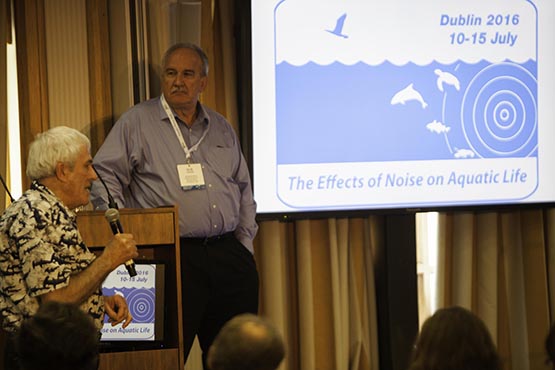 Anthony Hawkins (Aquatic Noise Trust UK) and Robert Gisnier (International Association of Geophsyical Contractors US) met with 300 scientists attending the 4th International Conference on the Effects of Noise on Aquatic Life. A public talk on Noise in the Ocean and its impact will be given tonight at 8 – 9:30pm at the O’Callaghan Alexander Hotel, Fenian Street, off Merrion Square in Dublin
Anthony Hawkins (Aquatic Noise Trust UK) and Robert Gisnier (International Association of Geophsyical Contractors US) met with 300 scientists attending the 4th International Conference on the Effects of Noise on Aquatic Life. A public talk on Noise in the Ocean and its impact will be given tonight at 8 – 9:30pm at the O’Callaghan Alexander Hotel, Fenian Street, off Merrion Square in Dublin
Mediterranean Gull Makes Her Home In Belfast
#MarineWildlife - A seabird usually found in the eastern Mediterranean has not only taken up residence in Belfast – she's successfully hatched her first chick.
The Belfast Telegraph reports on the Mediterranean gull that's been attracting bird watchers from all over Ireland to Belfast's Window on Wildlife nature reserve.
The species, very similar in appearance to the common black-headed gull, is rarely even spotted in Northern Europe, let alone known to breed in these parts.
But it seems mother and child are happy to stay in Northern Ireland's capital and feed on Belfast Lough's bounty of sand eels.
A Life on the Edge survey voyage is an attempt to log the abundance of life on Irelands’ southern shelf edge in September. Irish Whale & Dolphin Gropup's Patrick Lyne is issuing an invitation to join this survey to assist with sailing and logging of sightings and acoustics. This is the fifth year of operation and for the first time Lyne says he will visit the Whittard canyon and adjacent areas in what is one of Europe’s most remote and seldom studied offshore areas.
'We are sailing from Castletownbere in West Cork to Camaret in Brittany and have a few limited places to fill in the outward or return legs', Lyne told Afloat.ie
'We would normally expect to encounter large numbers of fin whale and would hope to encounter blue whales, humpbacks, sperm whales and many other species. It is an opportunity to see many species in a rather short time, in an undisturbed and natural setting' he says.
The vessel is Jessy a 37ft–yacht and all details of the trip and costs can be found here or for further information contact Patrick Lyne at [email protected]
Lough Neagh Dredging Brings NI 'Into Ridicule'
#LoughNeagh - Environmentalists have branded Northern Ireland a laughing stock for its failure to stop sand dredging in Lough Neagh, as the News Letter reports.
The issue is currently before the High Court after dredging firms appealed NI Environment Minister Mark Durkan's 2015 enforcement notice against the removal of as much as 1.8 million tonnes of sand from Ireland's largest lake.
And the practice has continued unabated, despite planning permission never being granted for sand dredging on the lough, a protected area for wildlife, said Gregory Jones QC on opening the application for judicial review by Friends of the Earth.
“This issue is bringing the planning system in Northern Ireland into ridicule," the charity's counsel told the court. “This is something one would not expect of the most primitive dictatorship.”
The News Letter has more on the story HERE.



























